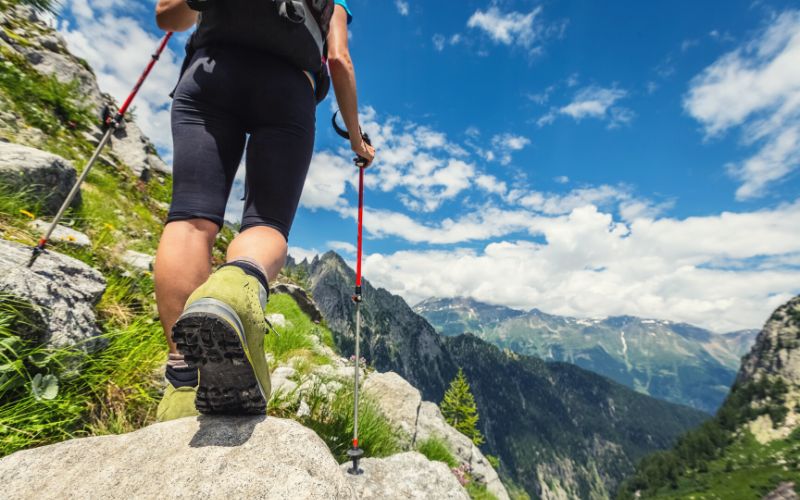Don’t know your cols from your cwms, your FSO from your PLB, or your gaiters from your giardia?
Never fear! We’ve put together a comprehensive list of all the important terms, slang, and jargon you need to know for your time on the trails. From trailspeak slang to need-to-know logistical terminology, our list covers the lot!
Table of Contents
- A Comprehensive List of Hiking need-to-knows
- 10 Essentials
- 14er
- Alpenglow
- Alpine start
- Alpine touring
- Alpine Zone
- Alpinism
- AT
- Backcountry
- Backcountry camping
- Backpacking
- Base camp
- Base layer
- Base weight
- Bear bag
- Bear canister
- Bear hang
- Beta
- Big Three
- Bivy bag
- Blaze
- BLM
- Blowdown
- Blue blazer
- Bomber
- Bothy
- Boulder field
- Brain
- Bushwhacking
- Cache
- Cairn
- Camel Up
- Car shuttle
- Cat Hole
- CDT
- Cirque
- Col
- Contour lines
- Cowboy camping
- Cowboy coffee
- Crampons
- Crest
- Crypto
- Day hike
- Declination
- Dispersed camping
- Dry camping
- DWR
- Elevation
- Elevation gain
- Exposure
- False summit
- Fastpacking
- Fire road
- FKT
- Food cache
- Food locker
- Ford
- Frontcountry camping
- FSO
- Gaiters
- Gap
- Giardia
- Glissade
- Gore-Tex
- GPS
- Gram counter
- Hardshell
- Headlamp
- High altitude
- High point
- Hiker hunger
- Hiker midnight
- Hiker trash
- Hillwalking
- Hut
- HYOH
- Ice axe
- JMT
- Kick steps
- Knob
- LASH
- Leave No Trace (LNT)
- Loop
- Microspikes
- Moleskin
- Moraine
- Mountaineering
- NoBo
- Notch
- NPS
- Out-and-back
- Outhouse
- Pack weight
- Packed weight
- Pass
- PCT
- Peak
- Peak bagging
- Pee rag
- Pit toilet
- PLB
- Plunge stepping
- Point-to-point
- Post-holing
- Primitive camping
- PUD
- Puffer
- Rock hop
- Route
- RT
- Rucksack
- Saddle
- Sand-bagging
- SAR
- Scrambling
- Scree
- Section Hiker
- Self-arrest
- Shared-use trail
- Shoulder season
- Single-track trail
- Slackcountry
- Slackpacking
- Slog
- Snowshoeing
- SoBo
- Social Trail
- Softshell
- Spork
- Spur
- Stealth camp
- Sufferfest
- Summit
- Switchbacks
- Talus
- Tarn
- Three-season
- Throne
- Thru-hiking
- Topo
- Tramily
- Trail angel
- Trail magic
- Trail mix
- Trail name
- Trail weight
- Trailhead
- Treeline
- Triple crown
- Type 1 Fun
- Type 2 Fun
- Type 3 Fun
- Yosemite Decimal System (YDS)
- Hiking Terms 101
A Comprehensive List of Hiking need-to-knows
10 Essentials
A list of ten must-have survival items recommended for hiking and backpacking. The list first appeared in “Mountaineering: The Freedom of the Hills” and included navigational tools, illumination, sun protection, insulation, first aid supplies, an emergency shelter, repair kit and tools, nutrition, hydration, and a fire starter.
14er
Any US mountain over 14,000ft tall with at least 300 ft of prominence above any saddle between it and a taller peak. The state with the highest concentration of Fourteeners is Colorado, which has 53.
Alpenglow
The pinkish light cast on mountains by the rising or setting sun.
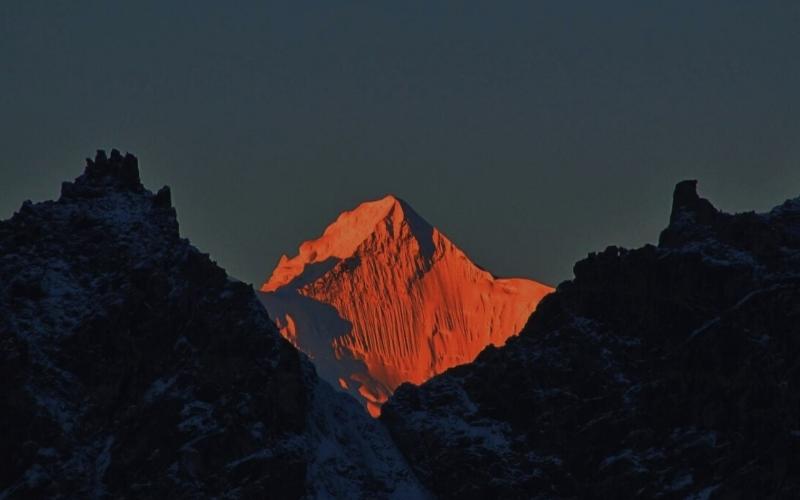
Alpine start
An “early start” to the hiking or climbing day, ranging from around 10 pm in the high mountains to 3 am.
Alpine touring
Aka ski-mountaineering, in which skiers use skins on the base of their skis to ski uphill. Alpine touring skiers usually travel from hut to hut on multi-day trips.
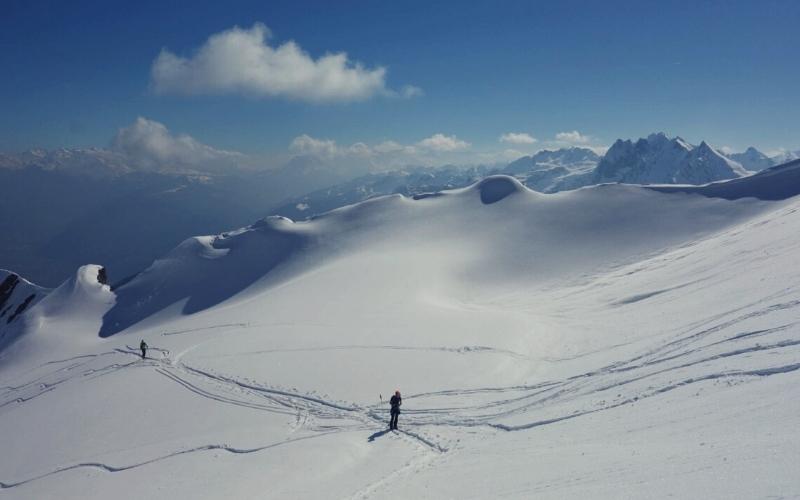
Alpine Zone
Elevations above the tree line in mountainous areas.
Alpinism
Climbing mountainous summits using rock climbing, mountaineering, and/or ice-climbing techniques in high-altitude mountain environments. The term is often used interchangeably with mountaineering but alpinism is typically associated with fast ascents undertaken in a single push with less gear.
AT
The abbreviation of the Appalachian Trail, the world-famous thru-hiking trail that stretches over 2,200 miles from Springer Mountain in northern Georgia to Mount Katahdin in Maine.
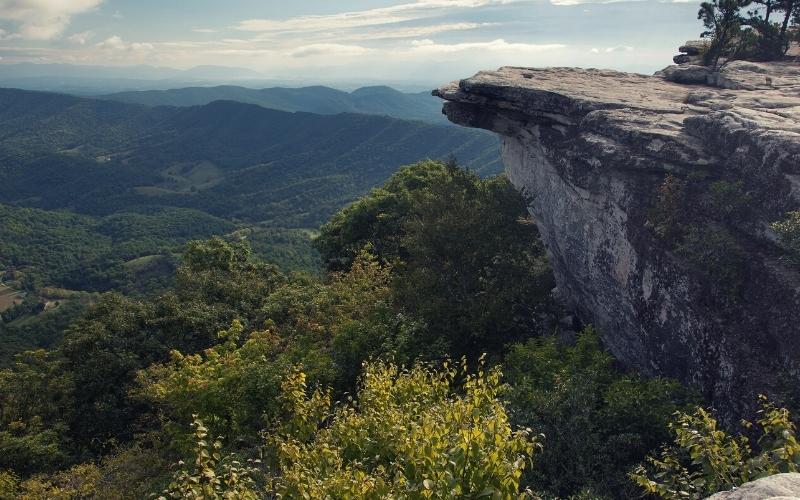
Backcountry
Remote and undeveloped areas with few or no facilities.
Backcountry camping
Camping in remote and undeveloped areas.
Backpacking
The activity of undertaking a multi-day hike while carrying everything you need (shelter, food, clothing, etc.) in your backpack.
Base camp
The main encampment for mountaineering expeditions in which parties store most of their provisions and supplies.
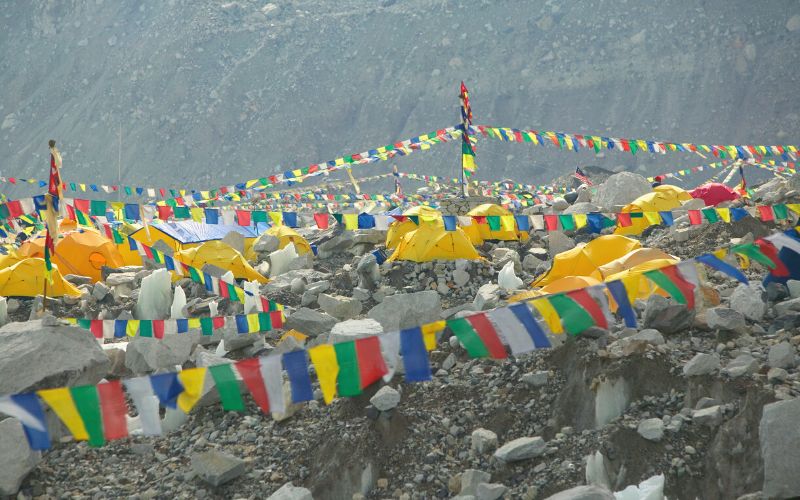
Base layer
The layer of clothing worn next to your skin. This layer should be breathable and high-wicking in order to manage moisture (i.e. sweat) by transferring it to subsequent layers, which in turn allow it to evaporate on their surface.
Base weight
The weight of all your gear, not including food, fuel, and water.
Bear bag
A bag in which you store all of your food and scented items to keep them out of reach of bears and rodents. Usually hung in a tree in a “bear hang” (see below).
Bear canister
A hard-sided, bear-resistant form of food cache used to prevent critters little and large from accessing your food.
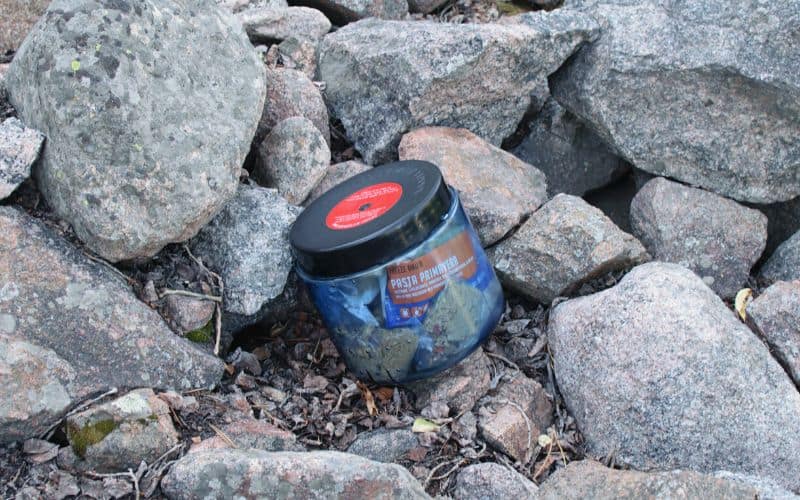
Bear hang
Hanging a bear bag from a rope slung over a tree branch to keep it out of reach of bears and other wild animals.
Beta
A term, appropriated from the rock climbing community, for information about a trail or route supplied by someone who has already hiked it.
Big Three
The three main (and most expensive) items in a backpacker’s kit – a tent, sleeping bag, and sleeping pad.
Bivy bag
A lightweight, one-person shelter used in place of a tent.
Blaze
Rectangular trail markers painted onto trees, rocks, and other features.
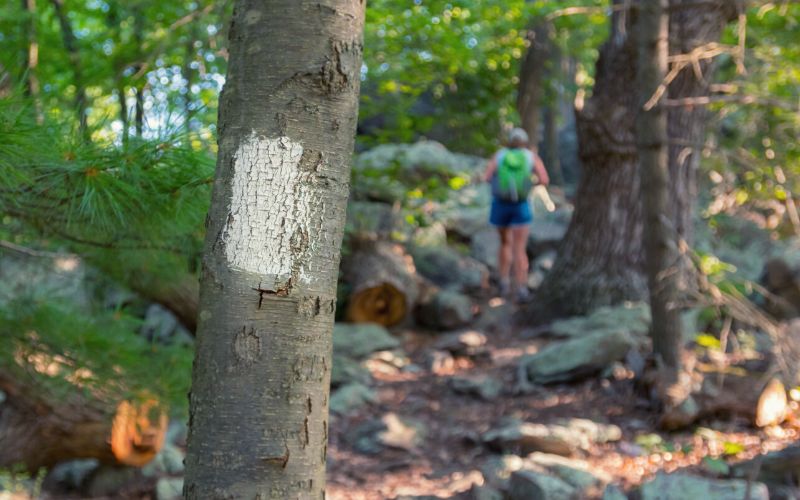
BLM
Acronym for the Bureau of Land Management, the agency responsible for the management of public lands in the US.
Blowdown
Trees that have fallen in a storm, particularly those that block the way on a trail or campsites.
Blue blazer
A hiker or backpacker who takes side trails and/or shortcuts on long-distance trails instead of sticking to the traditional route. The term derives from the Appalachian Trail, where side trails are marked with blue blazes.
Bomber
Aka “bombproof”. Anything (usually gear) that is extremely durable and reliable.
Bothy
Basic, open mountain or backcountry huts or shelters in the British Isles that are free for all to use.
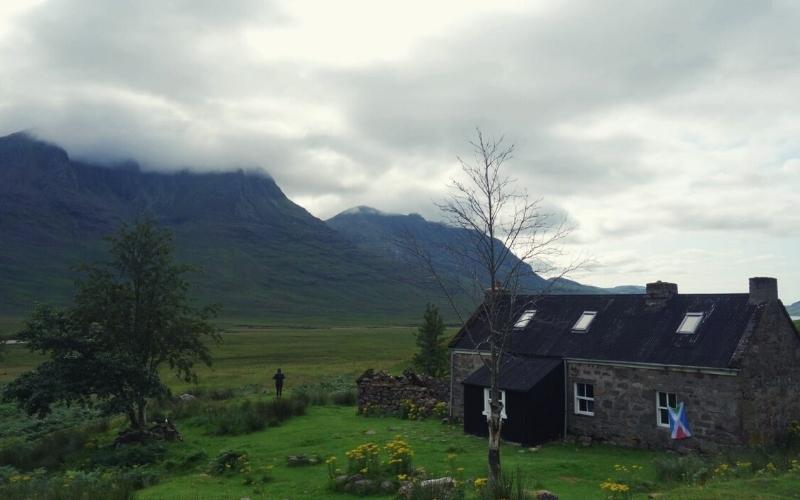
Boulder field
An expanse of terrain covered by boulders.
Brain
A colloquial term for the lid of a backpack.
Bushwhacking
Hiking off-trail, occasionally using a pole, machete, or axe to clear the way.
Cache
A location where a long-distance hiker or thru-hiker stashes supplies on their route. On dry stretches of thru-hikes like the CDT, water caches are often maintained by “trail angels” (see below).
Cairn
Man-made piles or stacks of rocks used as trail markers. “Cairn” is the Scottish Gaelic word for “pile of stones.”
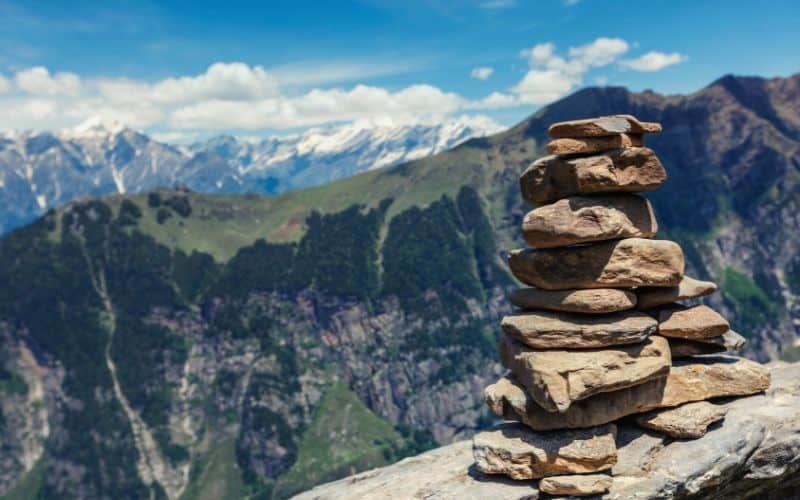
Camel Up
To drink as much water as possible at hydration points on long hikes, usually when faced with a long stretch before arriving at the next water source.
Car shuttle
Used on point-to-point hikes, this is when hikers travel in two cars, leaving one at the end of the trail and then returning to the start of the trail in the first car to begin their hike. This way, they have a means of returning to the trailhead upon completion of their hike and don’t have to hike the entire trail in reverse.
Cat Hole
A small hole, usually 6 to 8 inches deep, dug by hikers to bury their scat.
CDT
The abbreviation of the Continental Divide Trail, the longest thru-hike in the Triple Crown. The CDT stretches 2,700 miles from the border with Alberta, Canada in the north to the border with Chihuahua, Mexico in the south.
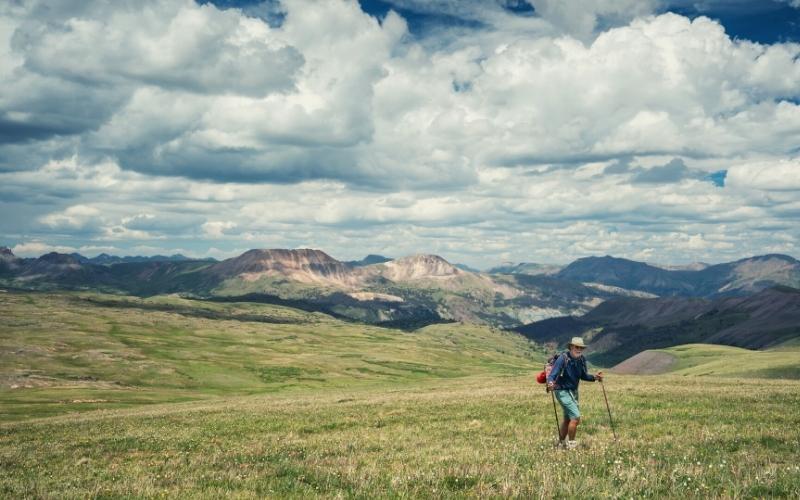
Cirque
A half-open hollow at the head of a valley formed by glacial erosion.
Col
Another word for a gap or saddle, refers to the lowest point on a ridge connecting two peaks.
Contour lines
The squiggly lines on maps that represent the shape of the terrain. The closer together contour lines are, the steeper the slope. Each fifth contour line is called an index line and has a number next to it that tells you the elevation at that point.
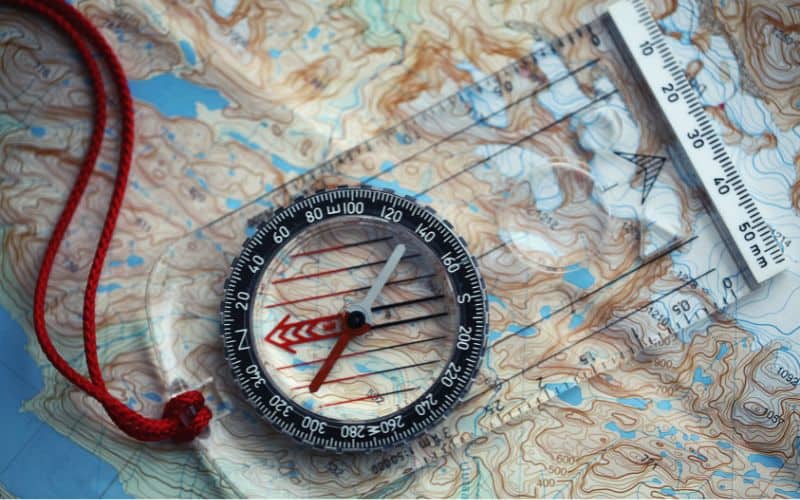
Cowboy camping
Sleeping al fresco in a sleeping bag without a tent.
Cowboy coffee
Coffee made by boiling coffee grounds in water, waiting for the grounds to sink to the base of the pan, then pouring the (hopefully) ground-free liquid up top into your cup. An acquired taste.
Crampons
Spiked traction devices worn on your boots to aid grip on ice and snow.
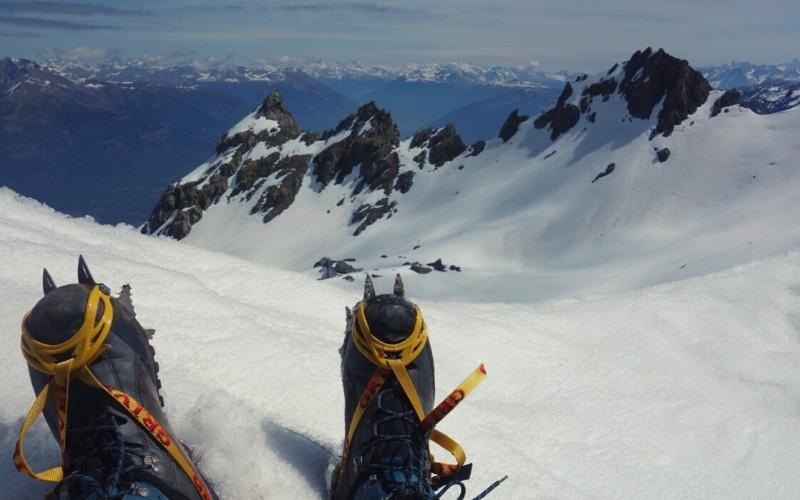
Crest
The highest ridge line of a mountain range or individual mountain.
Crypto
Abbreviation for cryptosporidium, a microscopic parasite occasionally found in wild water sources that causes the diarrheal disease cryptosporidiosis.
Day hike
Any hike that is short enough to complete in a single day.
Declination
Magnetic declination refers to the angle of deviation between the north displayed on your compass and true north. This varies depending on your location.
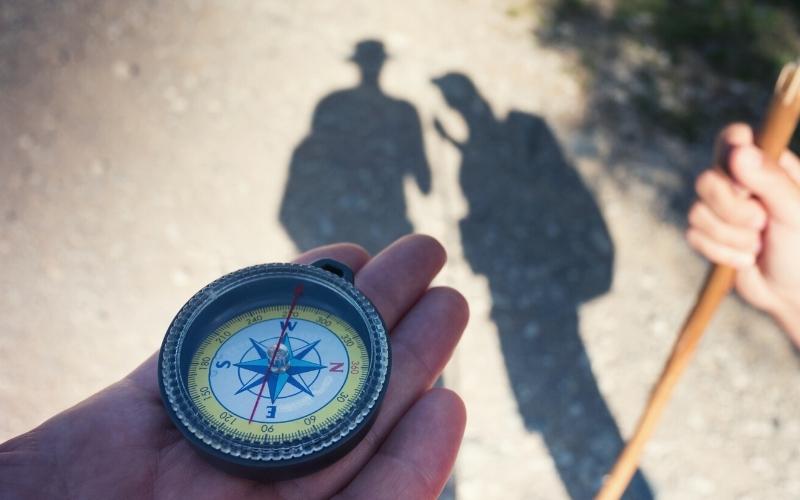
Dispersed camping
Camping outside of established campgrounds in an area with no facilities.
Dry camping
Camping in a location with no water source.
DWR
Acronym for Durable Water Repellent, a (usually) fluoropolymer finish applied to the surface of garments that causes water to bead up on the outside of the fabric rather than soak through.

Elevation
The height, in feet or meters, above sea level of any given location.
Elevation gain
The sum of every gain in elevation throughout an entire hike. This is sometimes also known as cumulative elevation gain or total ascent.
Exposure
Sections of hiking trails are described as “exposed” if there is a high risk of serious injury in the event of a fall because of the verticality of the terrain.
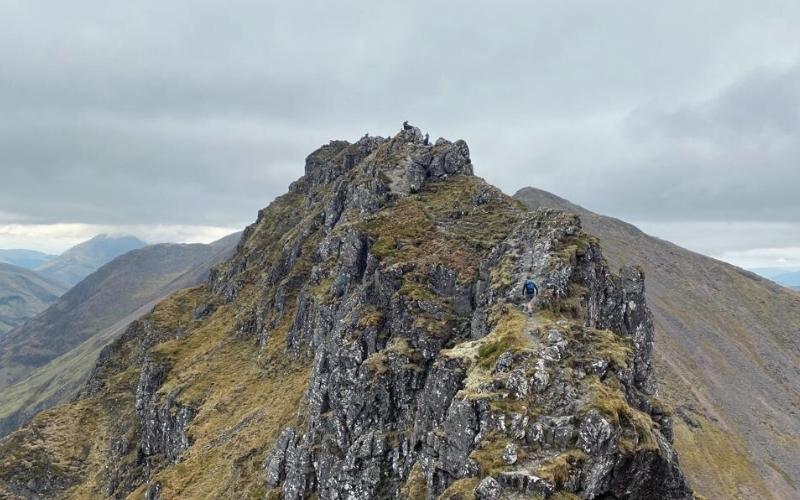
False summit
A peak or high point on a mountain that appears to be the summit from below. Upon reaching it, however, it is discovered that the real summit is higher.
Fastpacking
A crossover activity that combines backpacking and trail running.
Fire road
An unpaved, dirt track that provides firefighters and rangers with access to the backcountry.
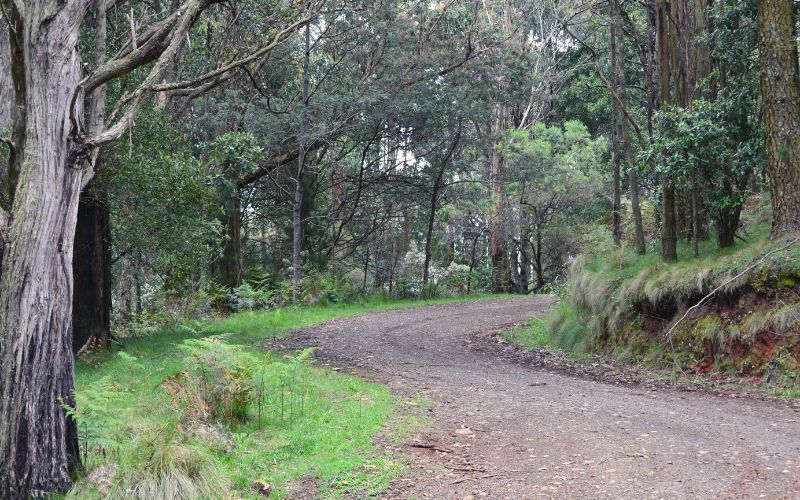
FKT
An abbreviation for “Fastest Known Time”, i.e. the speed record on any given route.
Food cache
A method used to protect your food from bears and other wild animals when camping or backpacking. Some of these methods include bear canisters, bear hangs, bear poles, bear cables, and food lockers.
Food locker
A secure box, often found at designated campgrounds in bear country, in which campers can store food to keep it safe from bears and other wild animals.
Ford
To cross a river.
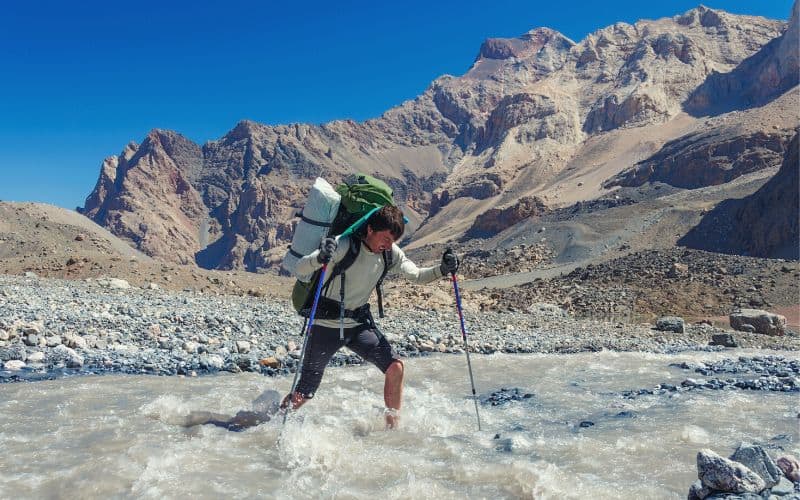
Frontcountry camping
Camping at established, car-accessible campgrounds.
FSO
From Skin Out, refers to the total weight of everything a backpacker is wearing and carrying.
Gaiters
Fabric guards that cover the gap between the collar of your boots and the bottom of your pants. Gaiters are usually waterproof and are used to keep water, snow, grit, sand, and pebbles out of your boots.
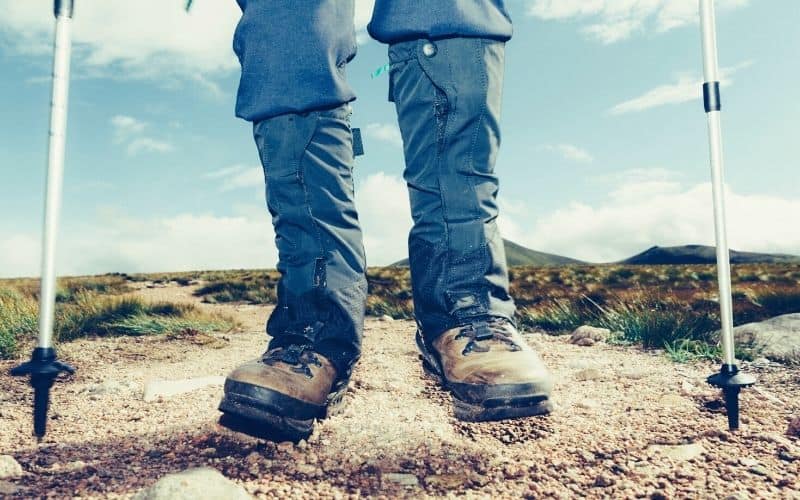
Gap
A saddle or col.
Giardia
A minuscule, water-borne parasite that causes giardiasis, a diarrheal illness. Giardia is usually transmitted via soil, food, or water contaminated with feces from infected animals or humans.
Glissade
To descend a snow slope by sliding down on your feet.
Gore-Tex
The brand name of the most popular waterproof-breathable membrane.
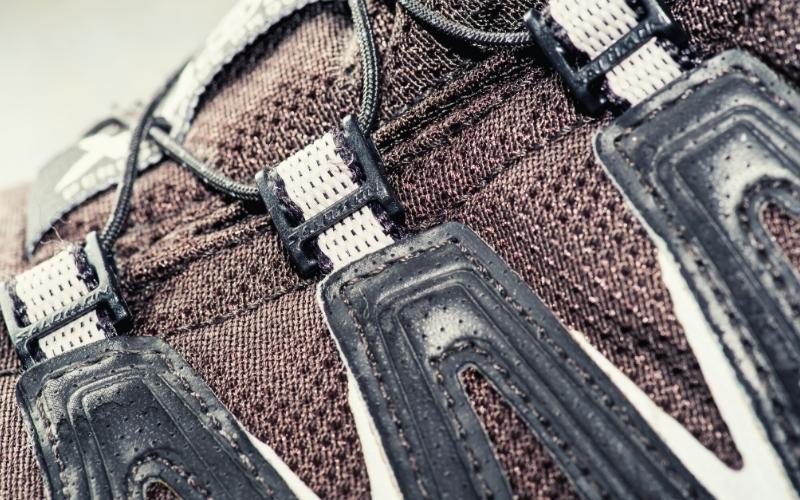
GPS
Global Positioning System is the navigational system that provides your location (on handheld devices and watches) by using multiple satellites.
Gram counter
A hiker or backpacker who places a strong emphasis on keeping pack weight to an absolute minimum. Also known as an ounce counter.
Hardshell
A waterproof-breathable jacket. The term is used to distinguish hardshells from softshell jackets or basic rain jackets.
Headlamp
A source of illumination worn on your head.
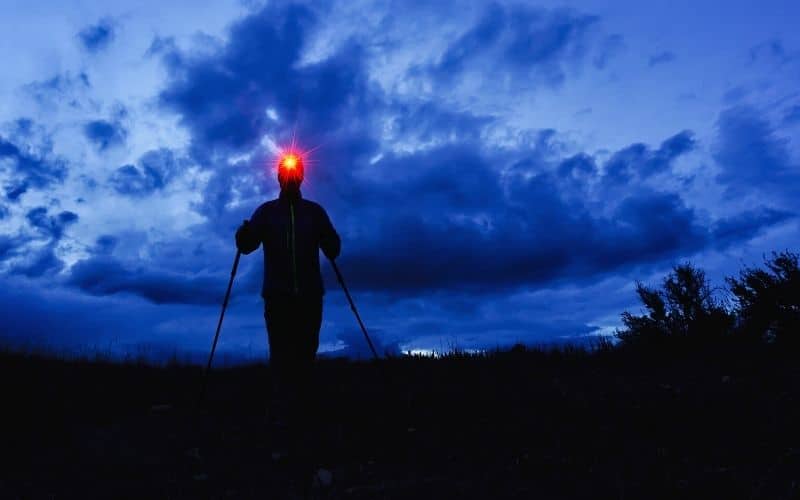
High altitude
Elevations of 8,000 ft or more above sea level. At this elevation, there is less oxygen in the air and many hikers experience symptoms of altitude sickness if not acclimatized.
High point
The highest point on any given trail or route.
Hiker hunger
The seemingly insatiable hunger that thru-hikers experience after a few weeks on the trail.
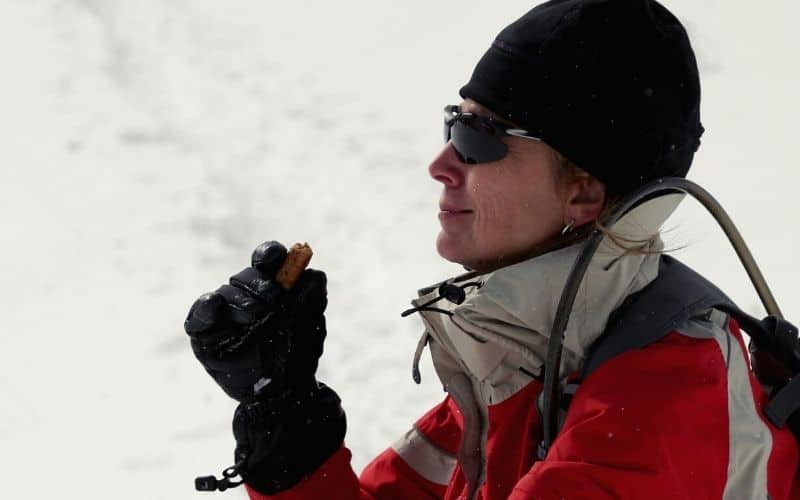
Hiker midnight
The time at which most backpackers hit the hay in the evening, usually around 9pm.
Hiker trash
A term of endearment for dirtbag hikers, i.e. those who embrace the frill-free, low-cost, low-maintenance lifestyle of long-term, long-distance hiking.
Hillwalking
The traditional British term for hiking.
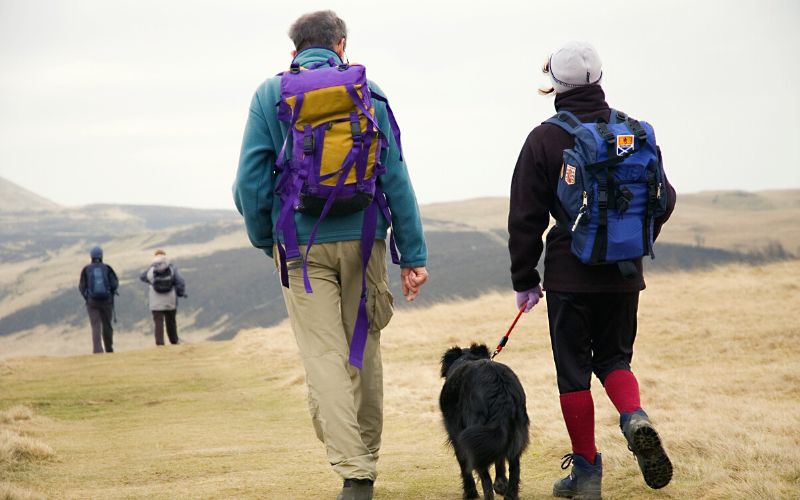
Hut
A backcountry or mountain residence where backpackers or mountaineers can spend the night. Huts range from unmanned and basic to luxurious, extravagant affairs with private rooms and dining.
HYOH
Hike Your Own Hike is the philosophy of hiking any trail in the way that suits you best, irrespective of the opinions, principles, or practices of others.
Ice axe
An axe used by ice climbers, hikers, and mountaineers. Hiking axes are designed to assist hikers when traveling on ice and snow. The shaft can be plunged into snow for support and the pick can be thrust into the slope when using the self-arrest technique in the event of a slip or fall. The adze of the axe can also be used to cut steps in snow or ice.
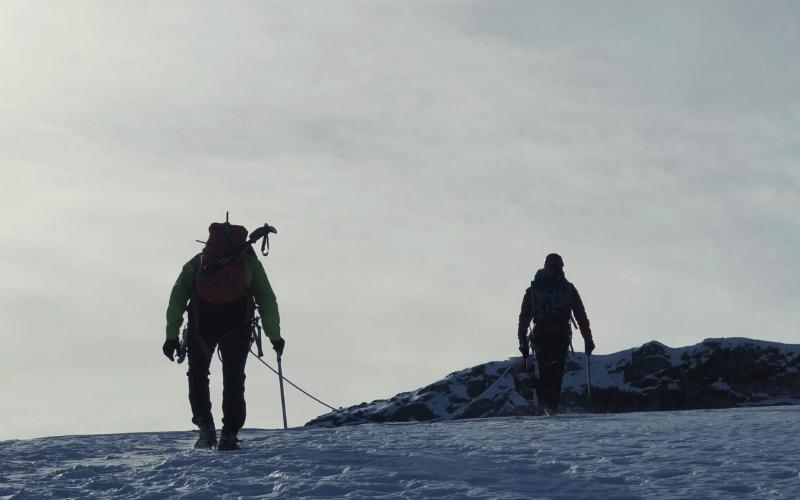
JMT
Abbreviation for the John Muir trail, a 211-mile route in California’s Sierra Nevada.
Kick steps
Kicking the toes of your hiking boots into snow on uphill slopes to provide grip and create steps.
Knob
A prominent rounded hill or outcrop.
LASH
A Long-Ass Section Hike.
Leave No Trace (LNT)
A set of seven outdoor ethics and principles created by the Leave No Trace Center of Outdoor Ethics to promote conservation in the outdoors.
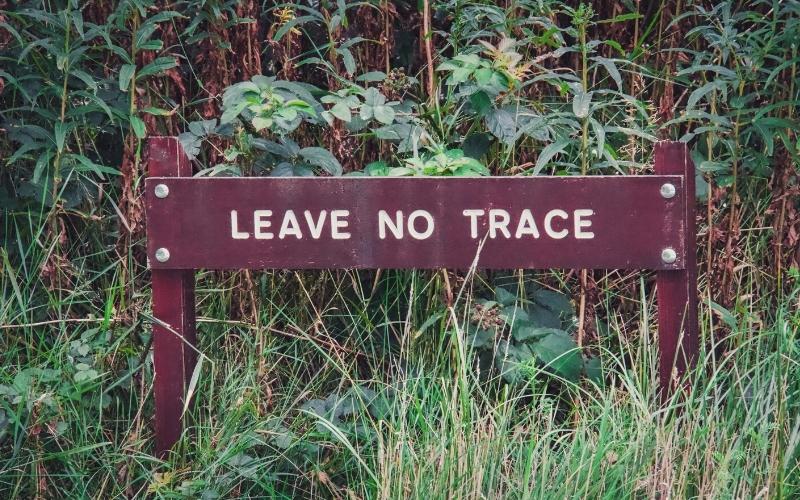
Loop
A hike that begins and ends at the same point.
Microspikes
Small, slip-on crampons used for stability, traction, and to avoid slipping on ice or snow. Microspikes, unlike most crampons, can be worn with almost any footwear.
Moleskin
Soft cotton fabric padding with a sticky adhesive backing on one side. Used to pad blisters to promote healing and reduce friction.
Moraine
Glacial detritus that takes the form of rocks, boulders, grit, and sediment at the base of an existing or extinct glacier.
Mountaineering
Climbing to the highest point of mountains using scrambling, rock climbing, ice climbing, and or ski-mountaineering skills and techniques.
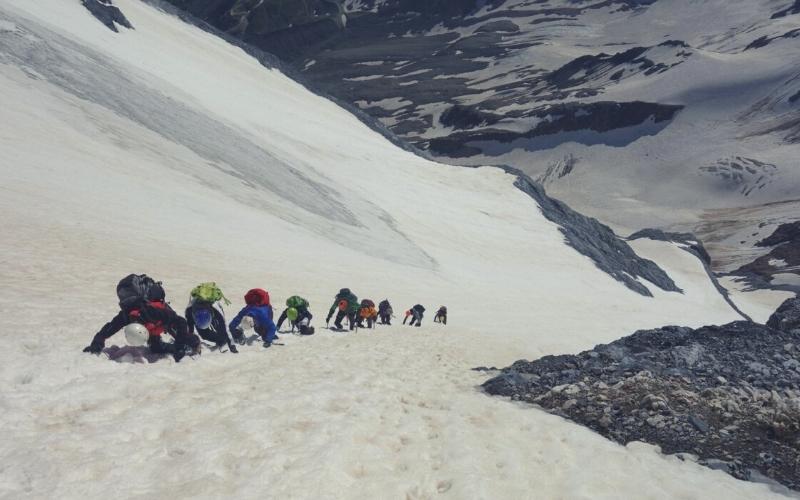
NoBo
Shorthand for “northbound”, i.e. the direction of travel of a hiker on any long-distance trail.
Notch
A small gap in a ridge or crest.
NPS
Acronym for National Park Service, the agency responsible for managing all national parks, monuments, conservatories, and historical properties.
Out-and-back
Hiking trails on which you return the same way that you came.
Outhouse
A small, usually basic building or hut that houses a pit toilet.
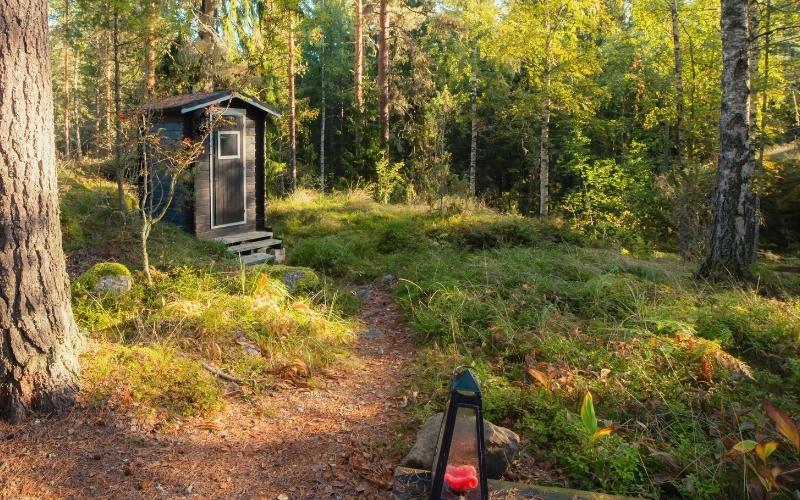
Pack weight
The weight of your backpack.
Packed weight
The total weight of the entire package of any hiking gear at the time of purchase. This can be contrasted with trail weight, which is the total weight of said item when stripped of packaging.
Pass
A path that crosses over a mountain ridge or between two mountains or hills.
PCT
Abbreviation for the Pacific Crest Trail, a 2,650-mile trail that travels through the Cascade Range and Sierra Nevada in California, Oregon, and Washington, spanning from the Canadian to Mexican border.
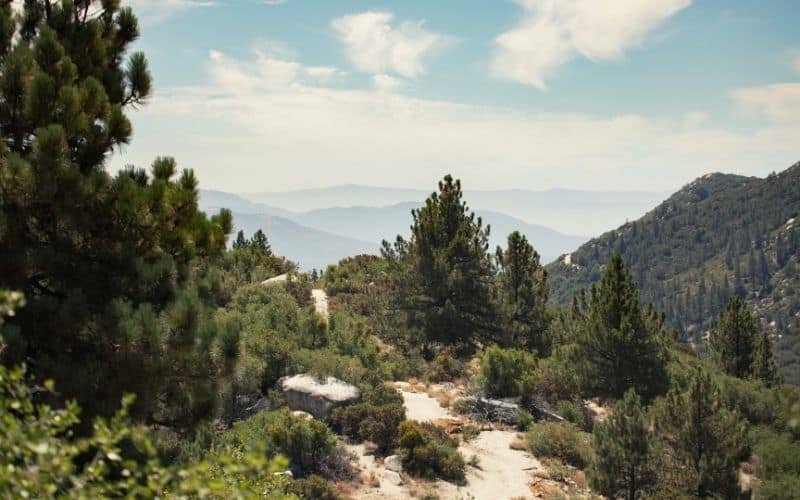
Peak
The summit or high point of a mountain. Also used as a synonym for ‘mountain’.
Peak bagging
Attempting to summit all the mountain peaks in any given area.
Pee rag
A piece of reusable cloth used in place of toilet paper when peeing.
Pit toilet
A rudimentary toilet with a pit or tank under the toilet seat instead of a flushing mechanism and sewage pipes. Waste collected in the pit is left to decompose or pumped out for disposal elsewhere.
PLB
Personal Locator Beacon, a device that transmits your location to rescuers in case of an emergency.
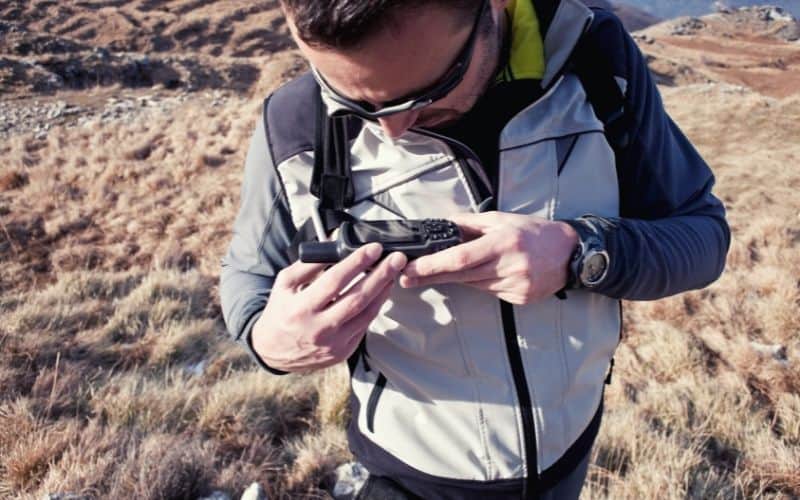
Plunge stepping
Driving your heel down into snow or soft ground when descending as a means of creating a platform for your feet and gaining traction. When using this method, the toe should remain pointed upward or level with the heel.
Point-to-point
Any hiking trail that begins at one location and ends at another, which isn’t the case with loop hikes or out-and-back hikes.
Post-holing
Plunging knee or thigh-deep into snow when hiking in winter.
Primitive camping
Also known as wilderness camping, this entails camping at remote, backcountry sites with few or no facilities.
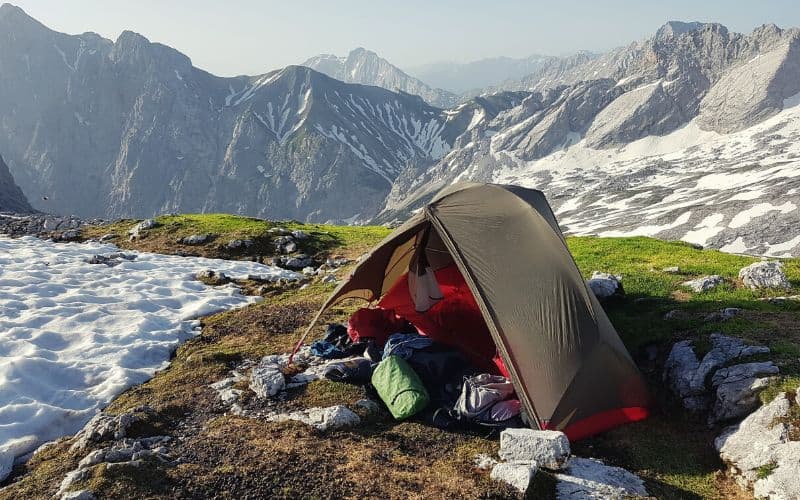
PUD
Pointless Ups and Downs.
Puffer
Colloquial term for an insulated jacket.
Rock hop
To cross a river, stream, or terrain by jumping from rock to rock.
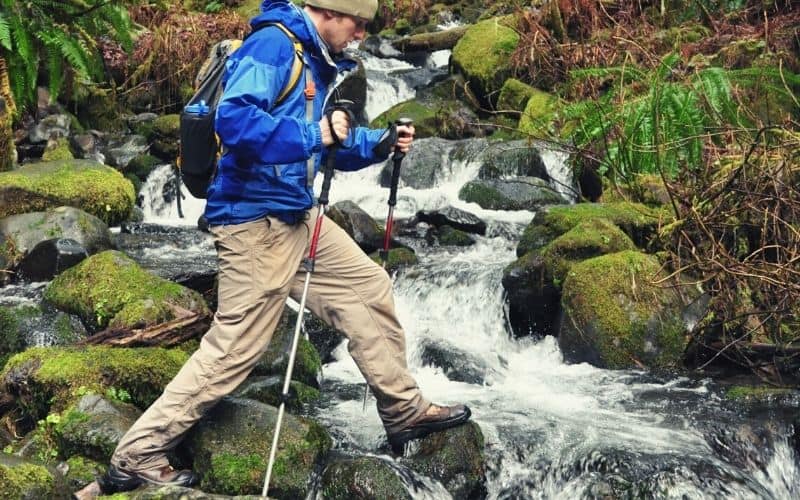
Route
The planned or designated course of travel to get from one location to another, usually by way of multiple trails.
RT
Abbreviation for “roundtrip”, which refers to the distance from the trailhead to your end point and back.
Rucksack
Another word for “backpack.”
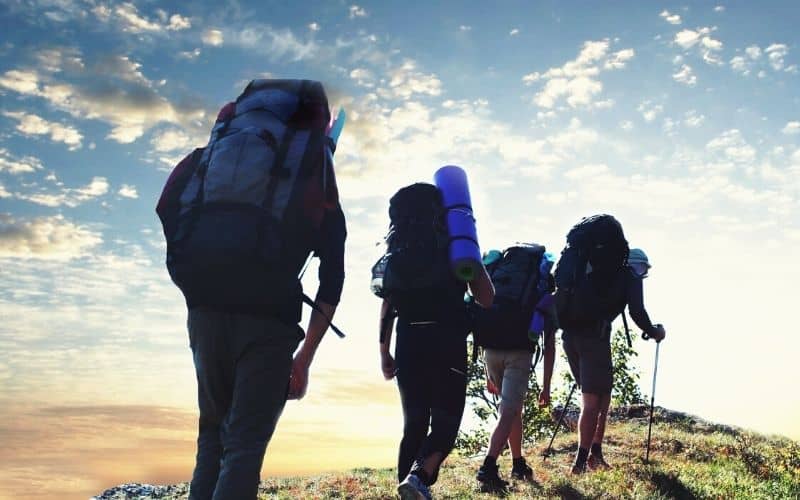
Saddle
Another word for a col or gap, a saddle is the lowest point between two peaks.
Sand-bagging
The act of leading another hiker to believe any trail or trail section is easier than it really is.
SAR
Acronym for “search and rescue”, used to refer both to the team of rescuers and the operation of rescuing stricken hikers.
Scrambling
Using your hands and feet to climb a section of rock on a hike.
Scree
Accumulations of loose rocks on a slope.
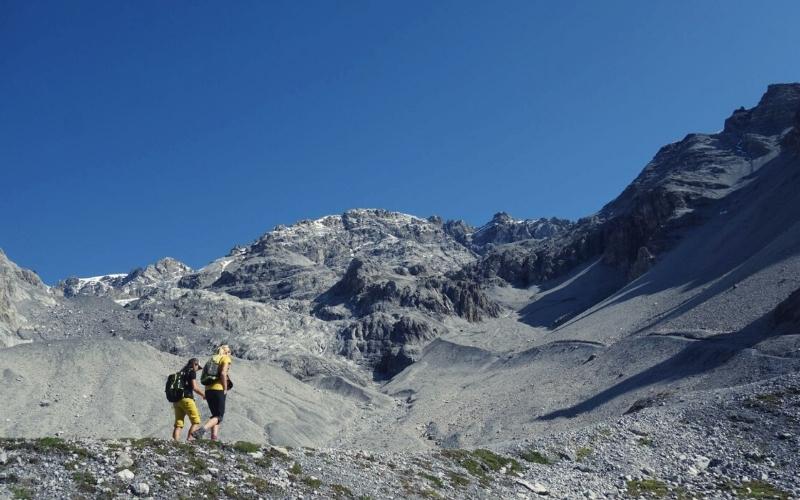
Section Hiker
A hiker who hikes sections of long-distance trails, or who hikes long-distance trails in sections.
Self-arrest
A technique that involves pressing the pick of your ice axe into a snow slope with the weight of your body to arrest your fall.
A trail that can be used by hikers, bikers, and equestrians alike.
Shoulder season
The months between the summer and winter seasons, i.e. spring and fall.
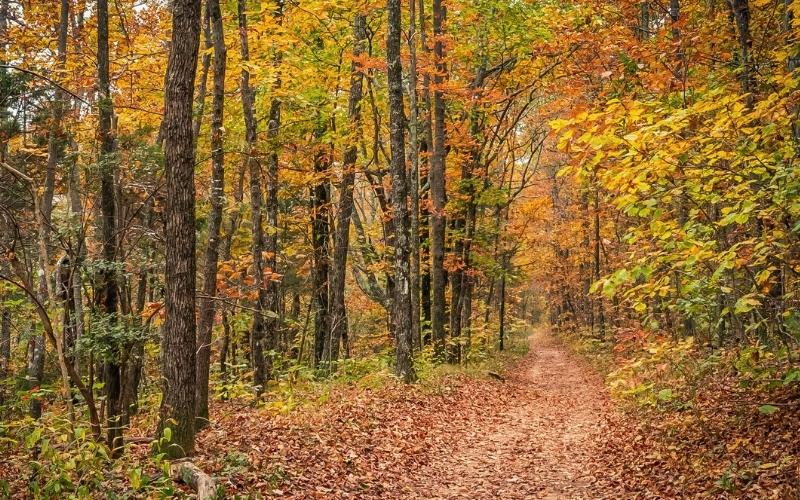
Single-track trail
A trail that is only wide enough for one user. In most cases, these are mountain biking trails and have been worn deep into the terrain by the passage of many tires. When hiking on single tracks, hikers should take care to avoid oncoming and fast-moving bikers.
Slackcountry
Any area of the backcountry that can be reached via a ski lift or gondola, that provides easy access to hikers or backcountry skiers who don’t fancy the approach!
Slackpacking
Having someone (or something) carry some or all of your gear for you when backpacking.
Slog
A challenging or otherwise disagreeable trail or section of trail.
Snowshoeing
Traveling in snowshoes, specialized footwear with a large footprint that allows hikers to walk over deep snow without sinking in or postholing (see above). outdoor gear for walking over snow.
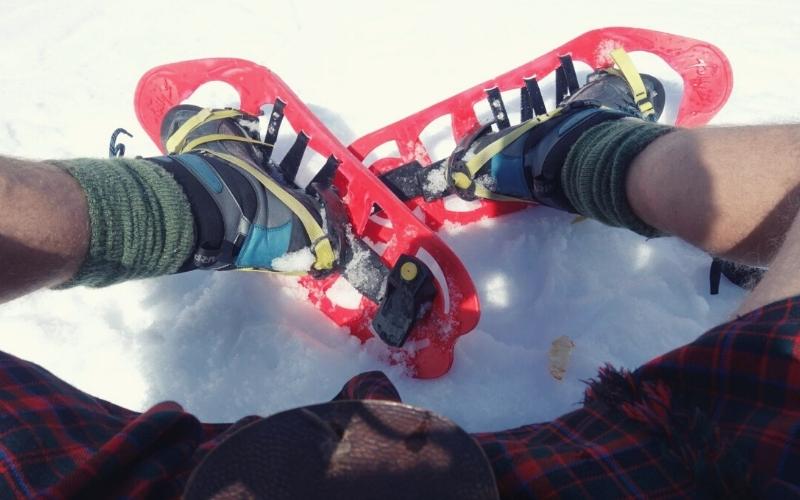
SoBo
Shorthand for “southbound”, i.e. the direction of travel of a hiker on any long-distance trail.
Social Trail
An informal, unmarked, and unmaintained trail formed by hikers repeatedly using the same route, mostly to create shortcuts between two trails or points of interest. Also known as a herd path.
Softshell
A jacket made with a soft, flexible material that is water resistant (not waterproof), breathable, and windproof.
Spork
A lightweight plastic or titanium kitchen utensil that has a spoon head on one end and a fork (and often a serrated knife edge) on the other.
Spur
A short trail that deviates from the main trail to reach a point of interest, such as an overlook, campsite, or waterfall.
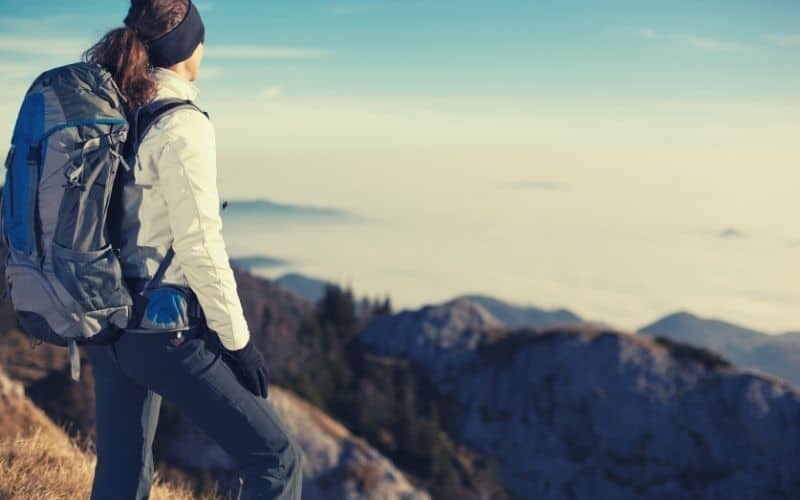
Stealth camp
Camping secretly in areas where camping is prohibited, either in a tent or a van.
Sufferfest
Any outing in which you suffer inordinately, usually as a result of heat, steep inclines, bugs, rain, or annoying hiking partners.
Summit
The highest point of a hill or mountain.

Switchbacks
Zig-zagging sections of a hiking trail. These are usually found on steeper ground as they reduce the gradient of ascent.
Talus
Slightly larger rock debris than scree.
Tarn
A small mountain lake, usually formed in a cirque.
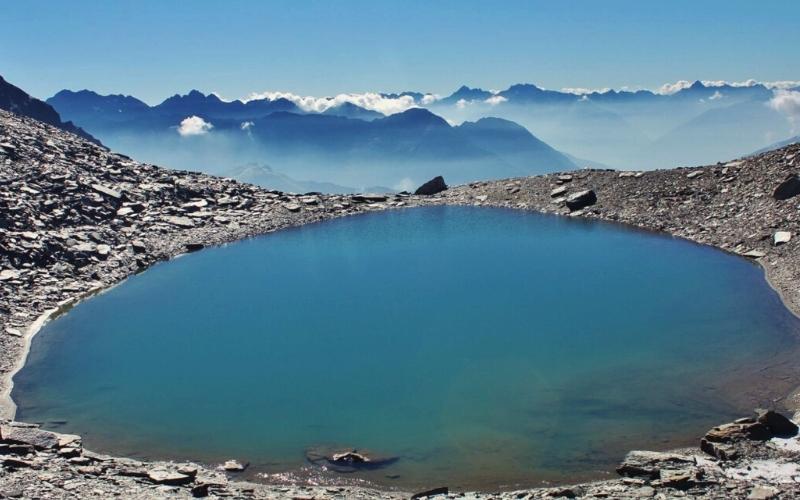
Three-season
Used to describe gear that is suitable for use in any season except winter.
Throne
A pit toilet with little or no enclosing structure to provide privacy.
Thru-hiking
Hiking a long-distance trail in its entirety, from start to finish, in one journey.
Topo
A topographical map.
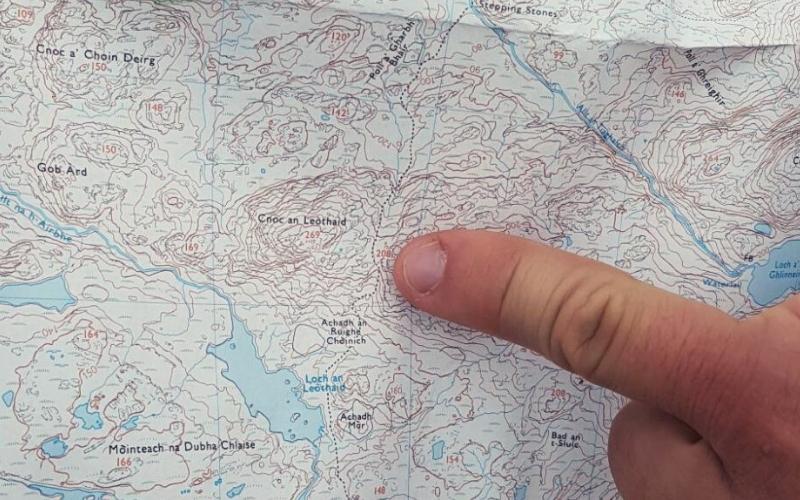
Tramily
A portmanteau of ‘trail’ and ‘family’ used to refer to fellow hikers who become like family, usually on long-distance hikes.
Trail angel
Anyone who provides trail magic.
Trail magic
Acts of kindness and generosity towards thru-hikers that are granted free of charge. This can include rides to and from trail towns, drinks, food, emergency repair, or accommodation. On popular thru-hikes, trail angels have been known to leave goodies such as meals, snacks, and water along the trail.
Trail mix
A common hiking snack that usually contains dried fruit, nuts, granola, seeds, and candy.
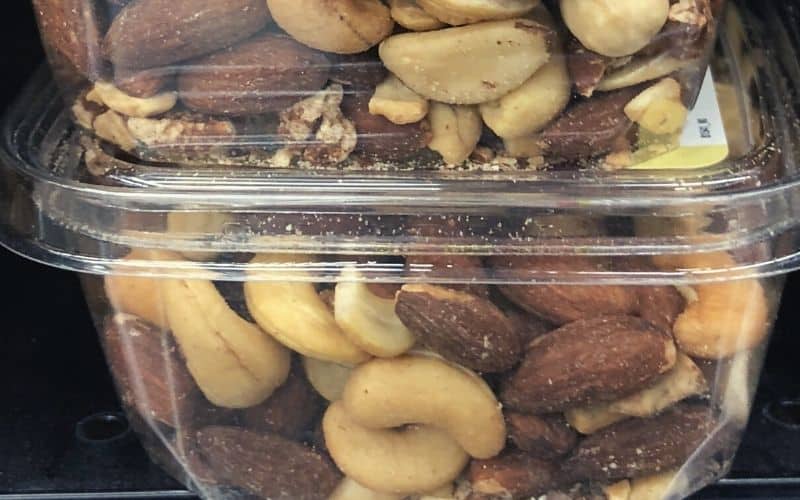
Trail name
A pseudonym used by hikers, mostly on long-distance trails. The most famous example is perhaps Alexander Supertramp (Cristopher McCandless).
Trail weight
The total weight of a tent with the minimum amount of components needed to assemble it, usually means the body, rainfly, and poles.
Trailhead
The starting point of a hiking trail.
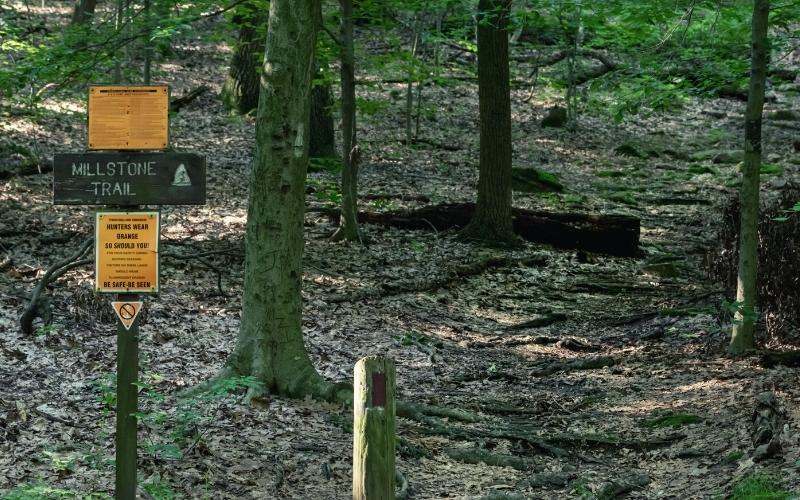
Treeline
The elevation at which trees no longer grow usually marks the crossing point into alpine terrain.
Triple crown
The award given by the ADLHA to long-distance hikers who have hiked the Appalachian Trail (AT), the Continental Divide Trail (CDT), and the Pacific Crest Trail (PCT) in their entirety.
Type 1 Fun
An activity that is fun from start to finish.
Type 2 Fun
An activity that isn’t fun while you are doing it, but with hindsight might be viewed in a more positive light.
Type 3 Fun
An activity that isn’t fun while you’re doing it or looked back on fondly after the event.
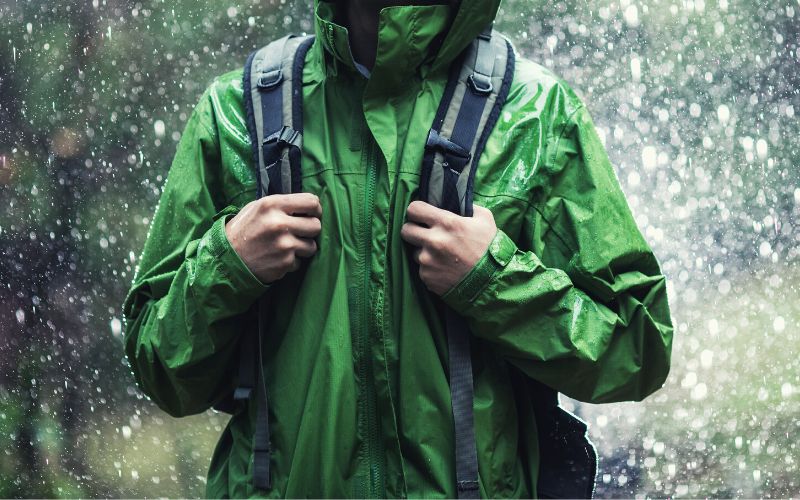
Yosemite Decimal System (YDS)
The rating system used in the US and Canada to grade the difficulty of hikes, scrambling routes, and rock climbs. Class 1 hikes are easy walking routes suitable for hikers of all ability levels. Class 3 and 4 hikes are technical scrambling routes that often require climbing equipment.
Hiking Terms 101
We hope our guide to hiking terminology and hiking slang has equipped you with all the vocab necessary for your time on the trails!
If we missed anything, let us know in the comments box below. And if you’d like to share this post with your friends, please do!
